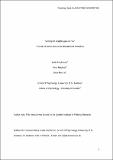Files in this item
Turning the analytic gaze on "Us" : the role of authorities in the alienation of minorities
Item metadata
| dc.contributor.author | Blackwood, Leda | |
| dc.contributor.author | Hopkins, Nick | |
| dc.contributor.author | Reicher, Steve | |
| dc.date.accessioned | 2015-01-01T00:01:35Z | |
| dc.date.available | 2015-01-01T00:01:35Z | |
| dc.date.issued | 2013 | |
| dc.identifier | 111382484 | |
| dc.identifier | a701b778-fd34-4957-98ef-f999d2b89520 | |
| dc.identifier | 000328684900004 | |
| dc.identifier | 84890265513 | |
| dc.identifier.citation | Blackwood , L , Hopkins , N & Reicher , S 2013 , ' Turning the analytic gaze on "Us" : the role of authorities in the alienation of minorities ' , European Psychologist , vol. 18 , no. 4 , pp. 245-252 . https://doi.org/10.1027/1016-9040/a000151 | en |
| dc.identifier.issn | 1016-9040 | |
| dc.identifier.uri | https://hdl.handle.net/10023/5960 | |
| dc.description.abstract | What leads to the alienation and political (dis) engagement of minority groups is a critical question for political psychologists. Recently, research has focused attention on one particular minority group - Muslims in the West - and on what promotes "anti-Western" attitudes and behavior. Typically, the research focus is on factors internal to the individuals or the minority communities concerned. However, we argue this overlooks the ways in which the perspective and practices of the majority group affect minority group member' understandings of who they are and how they stand in relation to the majority. In this paper we examine the social-psychological processes through which authorities' surveillance and intervention affects minority group members' sense of themselves, their relationship to authorities and the wider community. In doing so, we discuss a number of hitherto neglected psychological processes that may contribute to alienation-namely, processes of misrecognition, disrespect, and humiliation. We draw on research conducted with British Muslims to illustrate our argument for widening our analytic focus to give a more dynamic account of alienation and (dis) engagement. | |
| dc.format.extent | 8 | |
| dc.format.extent | 69937 | |
| dc.language.iso | eng | |
| dc.relation.ispartof | European Psychologist | en |
| dc.subject | Minority groups | en |
| dc.subject | Muslims | en |
| dc.subject | Alienation | en |
| dc.subject | Political disengagement | en |
| dc.subject | Political engagement | en |
| dc.subject | BF Psychology | en |
| dc.subject | RC0321 Neuroscience. Biological psychiatry. Neuropsychiatry | en |
| dc.subject.lcc | BF | en |
| dc.subject.lcc | RC0321 | en |
| dc.title | Turning the analytic gaze on "Us" : the role of authorities in the alienation of minorities | en |
| dc.type | Journal article | en |
| dc.contributor.institution | University of St Andrews. School of Psychology and Neuroscience | en |
| dc.identifier.doi | 10.1027/1016-9040/a000151 | |
| dc.description.status | Peer reviewed | en |
| dc.date.embargoedUntil | 2015-01-01 |
This item appears in the following Collection(s)
Items in the St Andrews Research Repository are protected by copyright, with all rights reserved, unless otherwise indicated.

